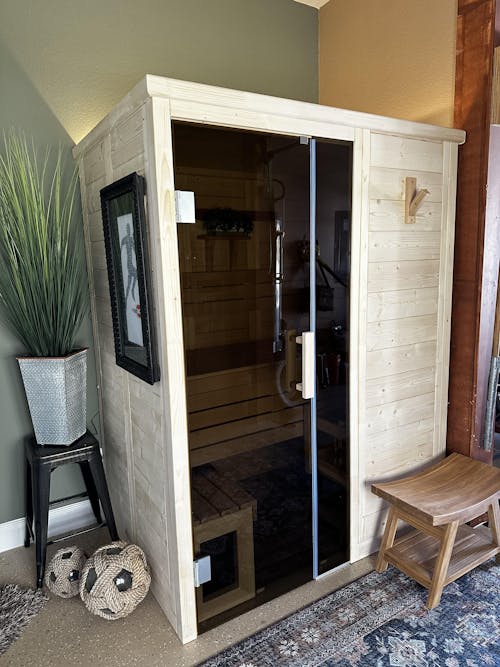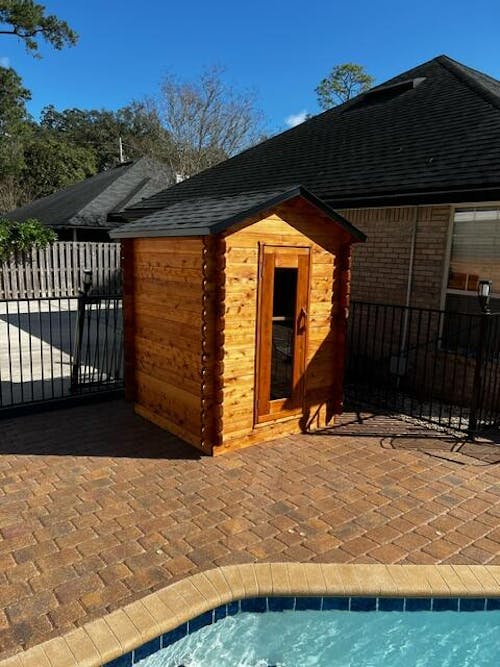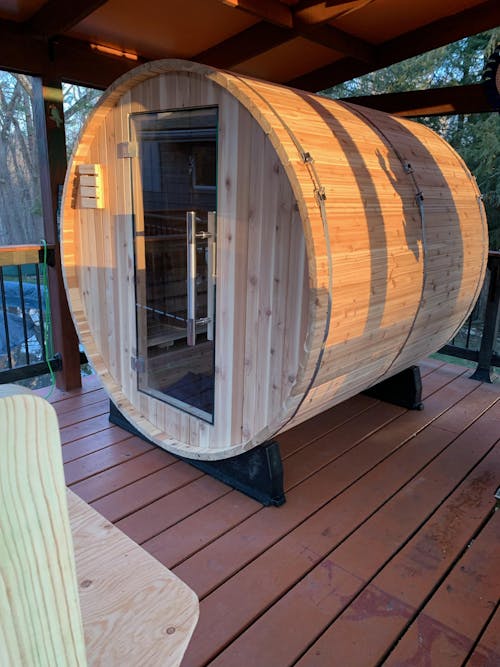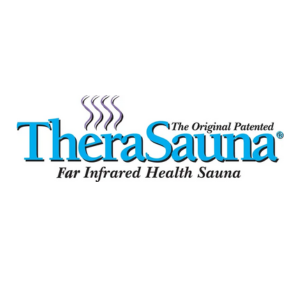Is Sauna Good for Asthma?
There's no denying the relentless nature of asthma. When you're coughing up a lung regularly, constantly struggling to fill your body with enough oxygen, or wrestling with chest tightness, life can feel a bit overwhelming.
What if we told you something as simple and pleasurable as a sauna session might hold the key to alleviating those symptoms? Sounds good, right?
Read on to find out how this ancient relaxation technique might bring some serious relief to your lungs and help you take control of your asthma.
What Is Asthma?
The American Lung Association describes asthma as a chronic lung disease that inflames and narrows your airways, making breathing difficult. In rare cases, poor asthma management can lead to airway remodeling.
Airway remodeling is a rather complex process in which the airway walls become thicker, stiffer, and narrower than normal because of prolonged and poorly controlled inflammation. This ultimately leads to blockage and a permanent loss of lung function (via WebMD).
The symptoms of asthma include:
-
Frequent coughing, particularly at night or early morning
-
Chest tightness or pressure
-
Wheezing or whistling sound when breathing out
-
Shortness of breath
-
Difficulty sleeping due to breathing problems
From time to time, you might experience 'asthma flare-ups' or 'attacks' — which is when the symptoms suddenly worsen due to exposure to asthma triggers.
During these episodes, the muscles around your airways tighten up, and the inner walls become swollen with more mucus. This obstructs airflow in the lungs, leading to non-stop coughing, labored breathing, tightened neck, difficulty talking, and a pale, sweaty face. Severe asthma attacks may require emergency care and can sometimes be fatal.
If you're wondering what causes asthma, it's a combination of genetic and environmental factors.
Some common triggers include:
-
Allergens (e.g., pollen, mold spores, pet dander)
-
Airborne irritants (e.g., smoke, pollution, dust)
-
Household chemicals
-
Bacteria and viruses (e.g., Covid-19 and RSV)
-
Respiratory infections, such as the common cold
-
Physical activity (exercise-induced asthma)
-
Weather changes
The most important but sometimes difficult-to-swallow fact? Currently, there's no definitive cure for asthma. However, you can manage the unpleasant symptoms and prevent flare-ups using quick-relief medicines or long-term control medications such as inhaled and nasal corticosteroids.
If you're looking for a complementary therapy that can be used alongside pills and inhalers, sauna baths could be a great solution.

Emergence of Sauna
Dating back to over 2000 years ago, saunas have been a go-to place for soul purification, relaxation, and even socialization. As time progressed, medical scholars started using it to relieve various ailments.
These days, there are two types of saunas available on the market:
Traditional Saunas
Also known as Finnish saunas or dry saunas, traditional saunas come equipped with an electric or wood-burning stove that can be used to heat a stack of rocks. These rocks then radiate heat into the room, raising temperatures anywhere between 150 to 195 degrees Fahrenheit.
Most people ladle water over heated rocks to increase humidity and make the air feel even hotter. While many sauna health myths are circulating around, research shows that regular sauna bathing can help improve circulation, reduce pain, boost the immune system, enhance sleep quality, improve liver function, and even lower your risk of heart disease.
Infrared Saunas
Unlike traditional saunas, infrared saunas use low EMF infrared lamps for heat therapy. The infrared waves penetrate deeper into the skin and heat the body directly, causing you to sweat profusely. The temperature in these saunas usually hovers between 120 to 150 degrees Fahrenheit.
While this temperature range might be a bit lower than traditional saunas, the benefits are just as powerful. Infrared saunas have been known to relieve back pain and inflammation, rejuvenate skin, and reduce arthritis symptoms. Since these sauna waves target your skin and cells, they may also help with certain skin conditions like acne, eczema, and wrinkles.
Benefits of Using Saunas for Asthma
Is a sauna good for asthma? Absolutely! Saunas may provide several benefits that can alleviate asthma symptoms and reduce the frequency and severity of asthma attacks.
A 2020 study published in The American Journal of Medicine explains that while a Finnish sauna may have a dry environment, it can hydrate respiratory tract mucus thanks to its high partial water pressure. This hydration could potentially alleviate symptoms of bronchial asthma.
Another 2017 study supported these findings, stating that sauna use can be beneficial for people dealing with various respiratory ailments, including COPD, bronchitis, pneumonia, sinusitis, and asthma.
Here's how it works.
The heat elevates your internal body temperature when you step into a sauna. This thermal elevation triggers your body to produce heat shock proteins known to have anti-inflammatory properties. This helps soothe tightened airways and reduce bronchial inflammation caused by allergens, ultimately relieving congestion and taming the nagging cough.
As we all know, saunas also promote sweating. Sweating helps flush toxins and allergens from the body. For people with asthma triggered by dust and pollen, sweating out allergens could potentially reduce flare-ups. However, more research on sauna's direct effects on allergies is still needed.
Studies prove that steam rooms increase the partial pressure of oxygen (pO2) in your blood while decreasing the hemoglobin's oxygen-binding capacity. More oxygen is then available to your muscles, which could help relieve the feeling of breathlessness and chest tightness often associated with asthma.
Research also shows that saunas may boost immune function by increasing white blood cell counts and antibodies. This enhanced immunity could help the body fight respiratory infections that commonly trigger asthma attacks.
The Asthma and Allergy Foundation of America points out that strong emotions like excitement, fear, anxiety, and even heartbreak can change our breathing patterns even if we don't have asthma.
Similarly, stressful situations such as blind dates, a job interview, or significant life events like moving to a new place, getting divorced, or losing a loved one can trigger asthma.
The good news is that saunas might lend a helping hand in managing these asthma triggers. Saunas stimulate the production of endorphins, our bodies' natural feel-good chemicals, while reducing cortisol levels. This helps asthma sufferers maintain emotional equilibrium and prevent anxiety-induced asthma episodes.

How to Use a Sauna for Asthma
Follow these tips to make the most of your sauna session for asthma:
-
Asthma symptoms can often worsen at night and early morning, so schedule your session accordingly. Visiting the sauna in the late afternoon or evening would be better for sleeping and waking up refreshed.
-
If your asthma is triggered by pet dander or fur, consider a sauna session after spending time with your adorable furry companion.
-
Saunas can make you sweat, leading to dehydration if you're not careful. Always drink plenty of water or isotonic fluid to maintain fluid balance and lubricate your trachea.
-
Acid reflux can trigger asthma symptoms. Avoid heavy, fatty meals at least an hour before your sauna session to keep reflux at bay.
-
While in the sauna, practice deep breathing. The moist, heated air could help to loosen mucus and relax those fiddly bronchial muscles, leaving you feeling all kinds of wonderful. If possible, breathe through your nose rather than your mouth.
-
Consider using an ionizer (a device that releases negative ions into the air) to improve the air quality in the sauna. This will further enhance breathability during your session.
-
Certain essential oils such as eucalyptus, lavender, thyme, clove, and tea tree have anti-inflammatory and decongestant properties. Add a few drops to the water when you pour it over the rocks.
-
If you feel lightheaded, dizzy, breathless, or generally unwell, exit the sauna immediately. These could be signs of overheating or dehydration.
Risks of Using Saunas with Asthma
While saunas may provide some benefits for asthma sufferers, there are also some risks to be aware of:
-
The heat and steam of a sauna can irritate sensitive airways and trigger asthma symptoms in some people. To mitigate this, keep your quick-relief inhaler nearby and exit the sauna if you experience wheezing, chest tightness, rapid heartbeat, or other concerning symptoms.
-
Some asthma medications, like bronchodilators, can increase heart rate and may not be compatible with sauna use. Consult your healthcare provider in this regard to adjust medication timing.
-
Saunas usually contain different elements that may irritate the respiratory tract and exacerbate asthma flare-ups. These include heat, steam, strong smells, aromatherapy oils, and chemicals used to treat sauna wood. Be aware of your personal asthma triggers and take precautions or avoid saunas if necessary.
-
Extended time in a sauna could potentially cause overexertion or heat exhaustion, which in turn might strain your body and ramp up asthma symptoms. To avoid this risk, limit your sauna sessions to 20 minutes max.
Best Sauna Recommendations for Asthma
When looking for a sauna that can provide asthma relief, these are the best saunas on the market:

Almost Heaven Audra 2-Person Canopy Barrel Sauna
The Audra sauna from Almost Heaven is a luxurious 2-person barrel sauna that provides asthmatics with a relaxing and therapeutic environment. This sauna comes with an efficient 8kW heater that raises the temperature to a cozy 175 to 180 degrees Fahrenheit in just 45 minutes.
Featuring a thick tongue and groove construction, this canopy sauna has contrasting clear hem-fir lumber benches for reclining back and laying down. There are two extra benches outside the sauna. If you start to feel chest tightness or breathing issues, you can simply step outside the sauna to cool down and catch your breath.
This sauna for asthma also has a back-lit lighting panel on the salt wall with multiple color choices to enhance the overall ambiance. It also boasts tempered glass windows that let in plenty of natural light while its door helps maintain privacy.

Golden Designs Bellagio 3-Person FAR Infrared Sauna
If you're looking for a way to add to your current asthma management techniques, the Golden Designs Bellagio 3-Person FAR Infrared Sauna could be a beneficial addition. This sauna features nine low EMF carbon heating elements that create a uniform heating environment to alleviate common asthma symptoms.
The sauna comes with a Bluetooth-capable music system with two dynamic speakers and a pre-amp, perfect for unwinding with your favorite tunes. It also includes a reading/chromotherapy lighting system to harmonize your body's energies and relieve stress that may contribute to asthma.
Crafted with natural Hemlock wood, the Bellagio Sauna is not just premium in function but also quite durable. It even has a clasp-together assembly for quick setup.
FAQs: Is Sauna Good for Asthma?
What is better for an asthma sauna or a steam room?
Regarding saunas and steam rooms, it truly depends on personal preference. For instance, with its high humidity and moist air, a steam room can help loosen mucus and clear airway obstruction.
On the other hand, a sauna's dry heat can relax and tense up bronchial muscles and temporarily improve lung function.
How often should I use a sauna for asthma?
For asthma, consider starting with two to three sessions per week, each lasting 10–15 minutes. If you're suffering from COPD, pulmonary fibrosis, tuberculosis, or any other serious respiratory disease, consult your healthcare provider to create a safe and beneficial regimen for your unique health profile.
Is the sauna safe if I'm having an asthma attack?
It is not recommended to use a sauna during an active asthma attack. The heat can potentially exacerbate symptoms and worsen breathing. Instead, you should follow your asthma action plan, take medicines, and seek medical help if necessary.
Takeaway: Is Sauna Good for Asthma?
Regular sauna use may provide holistic benefits of muscle relaxation, anti-inflammatory effects, improved immunity, enhanced cardiovascular function, and stress reduction, contributing to better breathing and fewer asthma flare-ups.
If you want to add sauna therapy to your asthma management plan, consider checking out MySaunaWorld's traditional and infrared sauna collection. For more information, feel free to contact us; we'd be happy to help!
SIGN UP. SAVE BIG.
Subscribe to be the first to know about our special monthly sauna sales, sent right to your inbox.

About the Author
Adam Fromson
Adam Fromson, co-founder of My Sauna World, loves saunas and their transformative health benefits. With years of experience exploring sauna culture and its impact on health and wellness, Adam is passionate about helping others discover the life-changing benefits of saunas for themselves.
Let customers speak for us
from 385 reviews
Good communication, easy delivery, easy set up, easy operation, great value. Recommended!

We ordered the 4 person barrel sauna and love it! We wanted a little extra space for the 2 of us/guests and it’s great. We could definitely fit 4 people in it if we needed. We use it every single day. It took about 10 weeks to get here because they build it specifically for the order. Putting the barrel together was fairly easy with 2 people. The electrical and the heater definitely required an electrician to install as we could have not done it alone.
We ordered the biggest heater (harvia spirit 8kw) and it heats up the sauna in about 15 mins inside our 40-50° garage. Overall this style of sauna is hotter and you sweat a lot faster than in an infrared sauna. I truly 10/10 recommend!
Pic is of us in the middle of building it.

Took me about 6 hours over 2 evenings to assemble almost all by myself. Had a pro run a new circuit from my panel. Very well made and assembly was straightforward. Heater is well sized and reaches operating temperature in under 30 minutes.

Great sauna very easy to assemble

The salt panel was a great addition to our Madison Sauna. It has excellent grain which is accented by the amazing color lights that glow through the panel. Also when you hit the rocks with a splash of water you can feel the heat bounce off the panel. Great addition if you are considering this option.

We can say enough about Sauna World there customer support is great! Our Pinnacle Sauna from Almost Heaven is epic.

The finish and quality is outstanding and it was quick and easy to assemble.

We are thrilled with our mini pod!! It came well shipped and our friend assembled it in 11 hours! Wow! We cannot wait to get healthy and sauna it up!

Beautiful sauna!!! Much easier than I expected to assemble, took a total of 4 hours. Can't wait to get warm by the pool on those cool evenings. Customer service was excellent..

Purchased a 2 person Almost Heaven barrel sauna and were delighted with the product. The order process was quick and easy, the sauna arrived on-time, installation was simple, following the provided instructions, and the sauna is extremely high quality. We’ve used it daily for over 2 weeks and quite frankly I don’t know how we lived without it. If I had it to do over again I wouldn’t change a thing... except maybe purchasing a 4 person model to easier share with friends!

Great Customer Service and a breeze to put together.Excellent shipping and the Sauna is top notch, couldn’t be happier






























